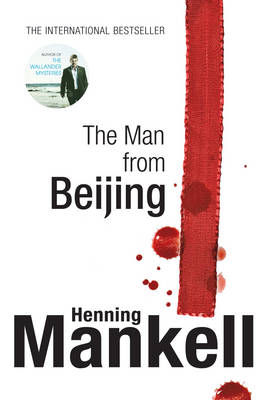
EURO CRIME
Reviews

Mankell, Henning - 'The Man from Beijing' (translated by Laurie Thompson)
Hardback: 368 pages (Jan. 2010) Publisher: Harvill Secker ISBN: 1846552575
The usual pattern in a crime novel is for a murder to take place and for the investigator(s) to gradually narrow down the various explanations until one is left and the perpetrator(s) are revealed. THE MAN FROM BEIJING, however, does the opposite - from a crime in a tiny, remote hamlet in the north of Sweden, the canvas broadens to elsewhere in the country, then backwards in time to China and the United States, then back to modern Sweden, with sojourns in China (extensively), Zimbabwe, Mozambique, Copenhagen and London. It's an ambitious approach and one which, with the aid of the as-ever superb translator, Laurie Thompson, the author pulls off superbly in a rounded novel that embraces themes of global insecurity and concern.
Birgitta Roslin is the linking character between many of these events. She's a workaholic judge who has been married for many years and who has four grown-up children. Her marriage has become stale, though, and she's prone to an introspective malaise about the state of society, based on the many cases she presides over, and about her own life and its future, now she is getting older. I find Birgitta a very attractive, mature and unusual protagonist: wise, sensitive and independent.
The novel opens with the aftermath of the massacre of most of the (very old) inhabitants of a remote village, arguably the worst crime that has ever happened in Sweden. The very well-described police and law-enforcement apparatus are confused by having no leads at all about the attack, and are very conscious of the intense media interest and public outcry. The main police detective is Vivi Sundberg, a red-haired, 50-something, career policewoman who is most intriguing and whom I would have liked to see feature more. (I hope she will appear again in future.) Like everyone else, Birgitta reads about the case in the newspapers and sees news broadcasts about it. When the names of the victims are released, Birgitta realises that she has a connection with two of the victims, who were her deceased mother's foster parents. She looks out some old documents from her mother's possessions and as a result travels north to see for herself what happened. Vivi allows Birgitta to visit the house in which her sort-of relatives died, and while there, Birgitta makes a discovery which, together with her mother's documents, makes her suspicious that the crime is part of a much bigger story. The police are not interested in her theories, even when she finds several leads locally, and her Internet research leads her to discover a similar crime that was committed in the USA a few days previously.
What follows is a journey both in time and place, as, via the documents in Birgitta's possession, she begins to understand more. Eventually she is forced to take some time off work because of high blood pressure, so she uses the time to travel to China with an old university friend who is attending a Sinology conference. There, Birgitta is attacked and robbed. She meets an intriguing woman from the security services called Hong Qiu, who takes Birgitta to see some examples of the Chinese justice system in action, and who is more connected to the Swedish crime than Birgitta can realise. Hong Qiu's poignant story takes much of the last quarter of this ambitious book.
I think THE MAN FROM BEIJING is marvellous, not only for its crime plot but mostly for its involving narrative of China and its many people - and by extension, government regimes elsewhere and the role of ruling elites compared with the vast majority of a nation's inhabitants - symbolised by a Zimbabwean woman who carries 50 kilograms of cement on her head. Not only is the plot well-constructed in terms of the small-scale crime and the much larger, global wrongdoing, but I found myself being challenged by the various perspectives of the complex socio-economic issues facing the world as its population, expectations and technology develop while its resources become ever-more depleted. Henning Mankell is wise enough to know there are no answers, but by putting forward several views, both international and historical, he raises many thoughtful questions. And, returning to the crime that started the book - most of it is explained although there are loose ends - some, but not all, of which are known to the reader if not to the police.
I do hope that Henning Mankell will return to Birgitta Roslin, and to Vivi Sundberg, in future. I thoroughly enjoyed making their acquaintance.
Read another review of THE MAN FROM BEIJING.
Maxine Clarke, England
March 2010
Details of the author's other books with links to reviews can be found on the Books page.
More European crime fiction reviews can be found on the Reviews page.